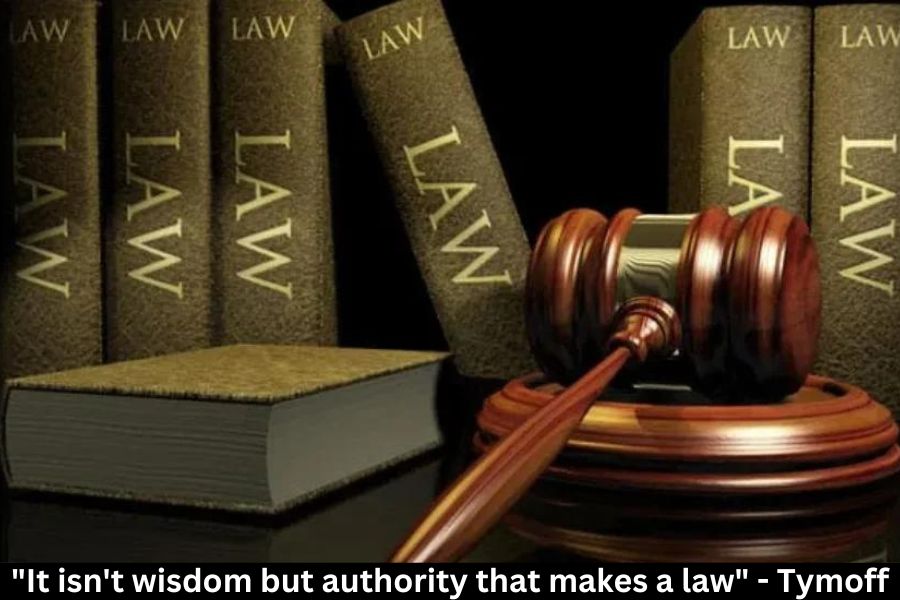Understanding the dynamics among expertise and authority within the introduction of legal guidelines is essential. The quote by Tymoff, “It isn’t always wisdom however authority that makes a regulation,” highlights a essential element of criminal systems. But what does it clearly mean? Let’s dive deep into this topic and discover its implications in element.
The Essence of the Quote
Meaning of “It isn’t information however authority that makes a law”
The quote indicates that the power to create legal guidelines lies not in the wisdom behind them however within the authority that enacts them. This highlights the difference between theoretical expertise and realistic strength.
Who is Tymoff?
Tymoff is an regularly-cited parent in discussions approximately law and authority. While no longer a whole lot is widely recognized about him, his quote has sparked many debates in legal and philosophical circles.
Historical Context
Laws in Ancient Civilizations
In ancient civilizations like Mesopotamia and Egypt, laws have been created by way of the ones in strength, frequently kings and pharaohs, who had the authority to implement them.
Authority in Historical Context
Authority has constantly performed a considerable position in lawmaking. Historically, those with electricity, whether monarchs or governing bodies, determined the laws of the land.
Authority vs. Wisdom
Defining Authority
Authority refers to the recognized electricity or right to enforce regulations, make decisions, and command obedience.
Defining Wisdom
Wisdom, alternatively, is the ability to think and act the usage of knowledge, experience, information, and perception.
The Role of Authority in Lawmaking
How Authority Establishes Laws
Authority establishes legal guidelines thru diagnosed power structures, which includes governments, that have the mandate to create and put into effect legal guidelines.
Examples of Authority-Based Laws
Authority-primarily based laws include the ones enacted through governing bodies with out direct enter from the population, which includes certain govt orders or decrees.
Wisdom in Lawmaking
The Ideal Role of Wisdom in Creating Laws
Ideally, wisdom ought to manual lawmaking to ensure that laws are just, truthful, and useful to society.
Examples of Wisdom-Based Laws
Wisdom-based totally legal guidelines are those derived from widespread studies, societal input, and moral issues, which includes progressive social reforms.
Case Studies
Authority-Driven Law: Case Study 1
An instance of authority-pushed law is the Prohibition era in the United States, in which alcohol changed into banned by means of authorities decree in spite of public competition.
Wisdom-Driven Law: Case Study 2
A wisdom-driven regulation instance is the implementation of environmental regulations based totally on medical studies and public fitness considerations.
Consequences of Authority-Based Lawmaking
Positive Outcomes
Authority-primarily based lawmaking can cause brief decision-making and implementation, that is useful in emergencies.
Negative Outcomes
However, it may also bring about legal guidelines that lack public support and are tough to put in force, leading to societal unrest.
Consequences of Wisdom-Based Lawmaking
Positive Outcomes
Wisdom-primarily based lawmaking has a tendency to supply extra equitable and sustainable legal guidelines that gain broader public acceptance.
Negative Outcomes
The drawback is that it is able to be a slower manner, frequently bogged down by using debates and consultations.
Balancing Authority and Wisdom
How to Strike a Balance
The secret is to create a device where authority and information complement every other, ensuring laws are each enforceable and simply.
Examples of Balanced Lawmaking
Balanced lawmaking may be visible in democratic structures wherein laws are proposed via elected representatives and subjected to public scrutiny and professional evaluation.
Modern Examples
Recent Authority-Based Laws
Recent examples include sure executive orders and emergency decrees issued at some point of the COVID-19 pandemic.
Recent Wisdom-Based Laws
Examples of new information-based totally legal guidelines consist of comprehensive healthcare reforms primarily based on big studies and public remarks.
Public Perception
How Society Views Authority-Based Laws
Authority-based totally legal guidelines are frequently regarded with skepticism, specifically if perceived as overreaching or unjust.
How Society Views Wisdom-Based Laws
Wisdom-based legal guidelines normally acquire extra public aid, visible as nicely-considered and inside the public interest.
Ethical Considerations
Ethics in Authority-Based Lawmaking
Ethical issues rise up whilst authority-based legal guidelines infringe on non-public freedoms and rights.
Ethics in Wisdom-Based Lawmaking
Wisdom-primarily based lawmaking faces moral challenges in making sure inclusivity and representing various societal pastimes.
Future of Lawmaking
Trends in Authority and Wisdom in Lawmaking
Future traits indicate a potential shift towards more balanced procedures, integrating authority with wisdom.
Predictions for Future Laws
Future legal guidelines may additionally an increasing number of mirror a blend of authority and expertise, aiming for rapid implementation without compromising on justice and equity.
Conclusion
The interplay between authority and expertise in lawmaking is complicated. While authority guarantees that laws are enacted and enforced, awareness ensures that those laws are just and useful. Striking a stability among the 2 is critical for the development of a truthful and practical prison system.
FAQs
What is the main concept of Tymoff’s quote?
The quote emphasizes that the electricity to create laws lies in authority rather than knowledge.
Why is authority important in lawmaking?
Authority is essential to make certain laws are enforced and observed.
Can legal guidelines be made solely based on knowledge?
While wisdom is vital, legal guidelines additionally require the backing of authority to be carried out correctly.
What are the risks of authority-based lawmaking?
It can result in legal guidelines that lack public help and may be visible as unjust.
How are we able to stability authority and knowledge in lawmaking?
By growing systems in which legal guidelines are made with each authoritative enforcement and clever, inclusive choice-making.
